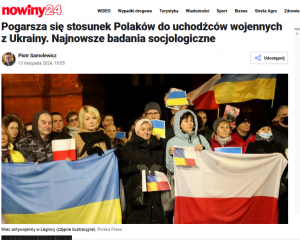Profesor Ірина Нечітайло opublikowała książkę o wojennym Charkowie

Profesor Ірина Нечітайло opublikowała ze współpracownikami książkę o swoim rodzinnym mieście, w którym cały czas przebywa podczas wojny. Są to wyniki badań nad mieszkańcami Charkowa i ich zdrowiem psychicznym.
Publikujemy streszczenie po angielsku. Zainteresowanych czytelników zapraszamy do korespondencji z profesor Ірина Нечітайло, Email: nechit@ukr.net.
Tutaj też znajduje się fragment monografii.
PSYCHOLOGICAL CONSEQUENCES OF WAR:
AN INTERDISCIPLINARY ESSAY ON KHARKIV AND ITS RESIDENTS
The collective of authors of the Kharkiv National University of Internal Affairs prepared the monograph „Psychological consequences of war: an interdisciplinary essay about the Kharkiv region and its inhabitants”
[Євдокімова О. О., Нечітайло І. С., Брусакова О. В. та ін. Психологічні наслідки війни: міждисциплінарний нарис про Харківщину та її мешканців : монографія / За заг. ред. д-ра юрид. наук, проф. В. В. Сокуренка; Харківський національний університет внутрішніх справ. Харків : Факт, 2024. 411 с.].
The monograph is based on the results of a study conducted by the research group of the Department of Sociology and Psychology of the Kharkiv National University of Internal Affairs (online survey). The field stage was implemented in October-November 2023. The respondents were representatives of the civilian population of the Kharkiv region (n=730). The toolkit included 175 questions, the basis of which consisted of questions developed using the following methods: 1) „The Modified BBC Subjective Well-being Scale (BBC-SWB)”; 2) „Neuropsychological Tension Questionnaire” (T. Nemchyn); 3) „Traumatic Stress Questionnaire” (I. Kotienev). In addition, a number of questions aimed at measuring features that are hypothetically considered independent variables affecting certain psychological states, (self) feelings, emotions, etc., were also included in the research toolkit. This included: the main social demographic, socio-economic, and other characteristics (gender, age, marital status, presence/absence of children, level of financial support and its dynamics, main type of activity, level of education); losses suffered by respondents during the full-scale invasion (human, material, property, physical and psychological health, etc.); and the presence/absence of experience of being in occupation.
The monograph has an interdisciplinary character. Chapter 1 „Days and nights of the Kharkiv Hero City (2022-2024)” (author: Dr. V. Grechenko) provides an overview of the events that took place in the Kharkiv region from the beginning of the full-scale invasion. Chapter 2 „Sustainability and vitality in the context of individual survival in extreme conditions” (author Dr. O. Yevdokimova) is dedicated to theoretical and methodological analysis of sustainability and viability as concepts that scientifically embody, explain, and justify the phenomenon of „indomitability” of Kharkiv and its inhabitants. The results of the empirical data analysis are presented in the next five chapters of the monograph. Chapter 3 „The population of the Kharkiv region under conditions of permanent stress: the main features of the socio-psychological portrait” (author Dr. I. Nechitailo) summarizes some social and psychological characteristics of the civilian residents of the Kharkiv region. Chapter 4 „Interrelationship of subjective well-being, neuropsychological tension and post-traumatic stress” (author: Dr. I. Nechytailo) presents the results of cluster and factor data analysis. Chapter 5 „The influence of socio-demographic characteristics on mental health and subjective well-being” (author: Ph.D. Yu. Tverdokhvalova) contains the results of a correlational and comparative analysis that reveals the influence of socio-demographic factors on the mental health conditions and subjective well-being of representatives of the civilian population of the Kharkiv region. Chapter 6 „Influence of socio-economic factors on mental health and subjective well-being” (author: Ph.D. Ya. Ponomarenko) contains the results of a correlational and comparative analysis that reveals the dependence of mental health states and subjective well-being on certain socio-economic statuses of representatives of the civilian population of the city of Kharkiv and the Kharkiv region. Statistically significant correlations are analyzed in Chapter 7 „The impact of traumatic experience (being in occupation) and losses in war on mental health and subjective well-being” (author: Dr. O. Brusakova) and the facts regarding the presence of this influence are given. The conclusions sum up and provide recommendations for psychological work with people who are in a state of increased or high neuropsychological tension with signs of post-traumatic stress.
The main conclusion of the study is that, in general, the mental state of representatives of the civilian population of the city of Kharkiv and the Kharkiv region is characterized by indicators of subjective well-being close to the norm. A key role here is played by strong interpersonal relationships, which have a positive effect on the state of psychological well-being and physical health. The general state of nervous and mental tension fluctuates between normal and moderate severity. The state of post-traumatic stress can also be characterized as moderate, while the propensity for deviant behavior, drug and alcohol abuse is extremely low. Typical problems of representatives of the population of the Kharkiv region are sleep disturbances, memory impairment, hypervigilance or, on the contrary, reduced attention, increased anxiety and depression. Self-confidence, work capacity, and everyday activity remain mostly high. Optimism and faith in the future are maintained at an average level, which is a good indicator, in particular, given the duration of the full-scale invasion, a long stay in the harsh conditions of war, in conditions of permanent stress, high uncertainty, proximity to hostilities, constant unpredictable bombing of civilian areas, objects, residential buildings, etc. from the Russian aggressor. Considering these results, the authors state that the difficult circumstances of the war certainly have affected the mental health of the population of the Kharkiv region, and certain negative signs are present. Despite this, representatives of the population of the city of Kharkiv and the Kharkiv region demonstrate a fairly high level of general psychological and social stability, which actually confirms their indomitability.



